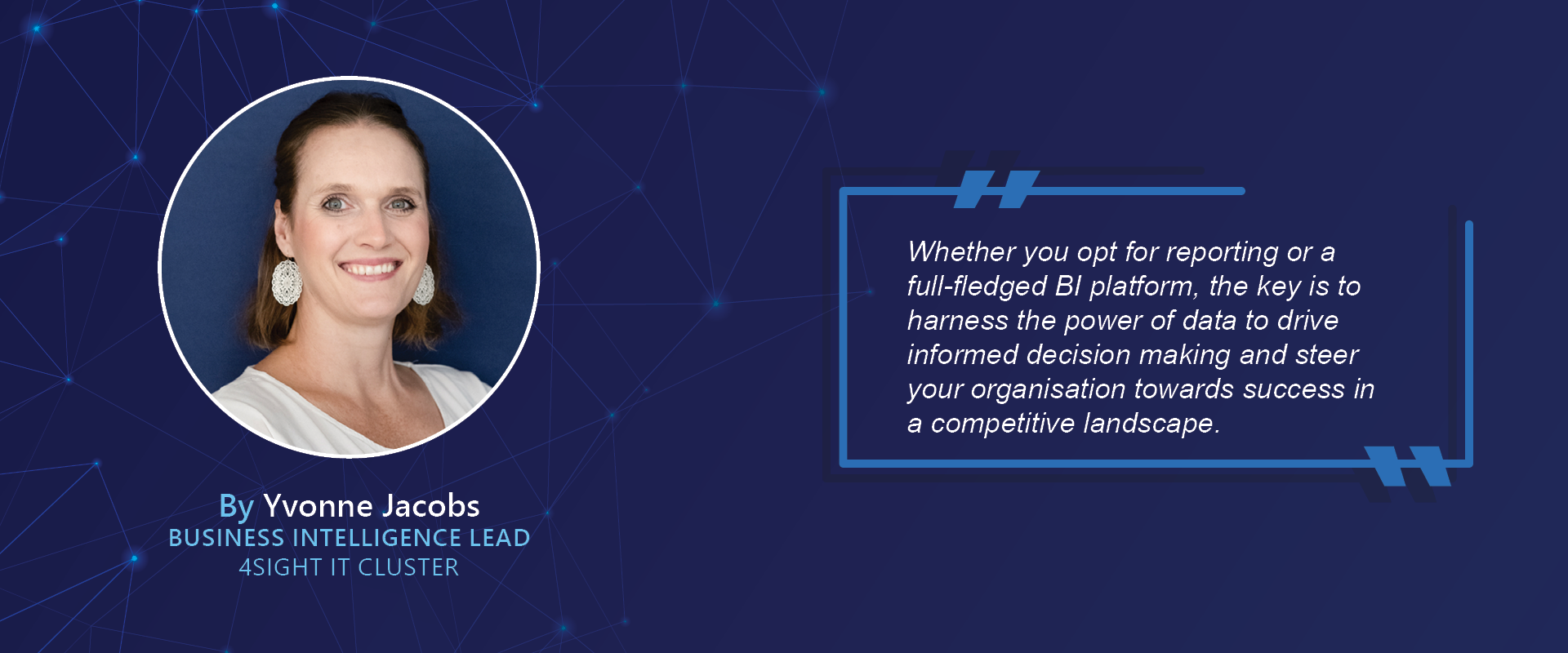Blog
Comparing Reporting and Business Intelligence Solutions, Which are Right for Your Company?

Whether you’re a small startup or a large enterprise, choosing the right solution can significantly impact your business’s success. Let’s delve into the key aspects of comparing reporting and BI solutions to help you make an informed decision.
Reporting and Business solutions begin and end with data – not just how data is collected, but also how data is stored, organised, and accessed. With a saturated market full of solutions to choose from, you need to have a clear understanding of your data needs before you start comparing options.
Understanding Reporting and Business Intelligence
Before we dive into the comparison, let’s clarify what reporting and BI solutions entail:
Reporting
Reporting solutions are tools that generate predefined, static reports based on specific datasets. These reports typically present historical data in a structured format, offering insights into past performance. Reports can be financial statements, sales summaries, inventory levels, and more.
Business Intelligence (BI)
BI solutions, on the other hand, are more comprehensive platforms that involve data collection, transformation, analysis, and visualisation. They provide the ability to explore data dynamically, create interactive dashboards, conduct ad-hoc queries, and uncover hidden patterns to support strategic decision making.
Factors for Consideration
Scope and Flexibility
Reporting solutions are suitable for generating routine reports with fixed layouts. BI solutions offer greater flexibility by allowing users to create custom dashboards, visualise data, and explore trends in real time. If your needs go beyond standard reports, a BI solution might be more suitable.
Data Integration and Transformation
BI solutions often have robust ETL (Extract, Transform, Load) capabilities, enabling data integration from various sources. Reporting tools, while capable of handling data from multiple sources, might require more manual effort for data transformation and integration. If you’re dealing with data from various sources like databases, spreadsheets, APIs, and cloud services, a BI solution’s data integration and transformation capabilities can streamline the process.
Interactivity and User-friendliness
BI solutions emphasize interactivity, enabling users to manipulate data, apply filters, and drill down into specific details. Reporting tools are generally less interactive, focusing on presenting data in a structured format.
Real-Time Analytics
BI solutions excel at providing real-time or near-real-time insights, crucial for making agile business decisions. Reporting tools might lag behind in this aspect, as they often deal with historical data.
Complex Analysis
BI solutions offer advanced analytical capabilities like data modelling, predictive analytics, and complex calculations, predictive modelling, advanced calculations, and complex data transformations. If you require in-depth analysis beyond basic metrics, BI is the way to go.
Scalability
Reporting tools are well suited for smaller datasets and specific reporting needs. BI solutions are designed to handle large volumes of data and can scale as your organisation grows. If your organisation anticipates growth in data volume and complexity, a BI solution’s scalability ensures it can handle increasing demands over time.
Cost Considerations
Reporting solutions might be more cost effective for organisations with simpler reporting needs. BI solutions can be pricier due to their broader capabilities, but they offer a higher ROI when it comes to strategic decision making.
Data Exploration and Analysis
If your organisation requires in-depth analysis, data exploration, and the ability to uncover hidden patterns and insights, a BI solution is more suitable. BI tools allow for ad-hoc queries, data visualisation, and dynamic dashboards that empower users to make strategic decisions.

Choosing between reporting and BI solutions depends on your organisation’s specific requirements and goals. If you primarily need structured, historical reports with minimal interaction, a reporting solution could be sufficient. However, if you seek to uncover insights, visualise data, and empower users with dynamic analytics, a BI solution is the way forward.
Remember that technology is constantly evolving, and what might be a better fit today could change as your business needs evolve. It’s advisable to assess your current and future needs, involve stakeholders and consider a solution that aligns with your long-term growth strategy.
Whether you opt for reporting or a full-fledged BI platform, the key is to harness the power of data to drive informed decision making and steer your organisation towards success in a competitive landscape.
In summary, the choice between a reporting solution and a BI solution depends on the depth of analysis, interactivity, real-time requirements, and long-term growth strategy of your organisation.
For businesses with simple reporting needs, a reporting solution might suffice. However, if you’re looking to derive deeper insights, support data-driven decision making, and empower users with more dynamic analytics, investing in a BI solution is the wiser choice.
Ultimately, before making a decision, it’s crucial to assess your organisation’s current and future needs, involve stakeholders, and consider both short-term and long-term benefits when evaluating the right solution for your unique circumstances.
To discover Reporting and Business Intelligence Solutions, Contact This email address is being protected from spambots. You need JavaScript enabled to view it.


